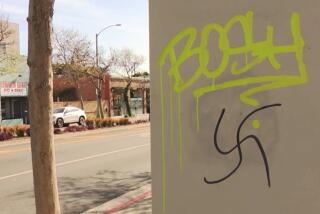A Stand Against Hate
The arrest last week of three men charged with throwing a burning cross at the home of an interracial couple in Shadow Hills is an example of what can happen when a community stands up against hate.
Neighbors rallied around the couple, contributing $1,000 to the $20,000 offered by the Los Angeles City Council and county Board of Supervisors for information leading to a conviction in the case.
Los Angeles police credit the reward as being instrumental in leading to the arrest of the three men after they allegedly told others of their involvement.
The three were arraigned on a felony charge of burning a cross with the intent to terrorize, punishable by a maximum sentence of seven years in prison. They pleaded not guilty; a preliminary hearing is scheduled for next week.
The reward played a symbolic as well as a practical role. It was a way--one of many--for city and county leaders and community residents to express collective outrage.
City Councilman Joel Wachs denounced the incident as a cruel and heinous hate crime reminiscent of the burning crosses used by the Ku Klux Klan. Neighbors and residents from nearby Lake View Terrace wrote letters to The Times publicly deploring the cross burning. Privately, they telephoned the couple, offering their support.
An aggressive response is important for the message that it sends to perpetrators--of this hate crime and others--that such ugly acts have no place in our community.
And such a response is critical for the message it sends to victims. A hate crime is intended to instill fear and isolation. Its victims must be assured that they are not alone and forgotten.
Inaction in the face of hate crimes, says a guide put out by the Southern Poverty Law Center, “will be interpreted as acceptance by the haters, the public and, worse, the victim.”
There was no mistaking the response in Shadow Hills.
More to Read
Sign up for Essential California
The most important California stories and recommendations in your inbox every morning.
You may occasionally receive promotional content from the Los Angeles Times.










